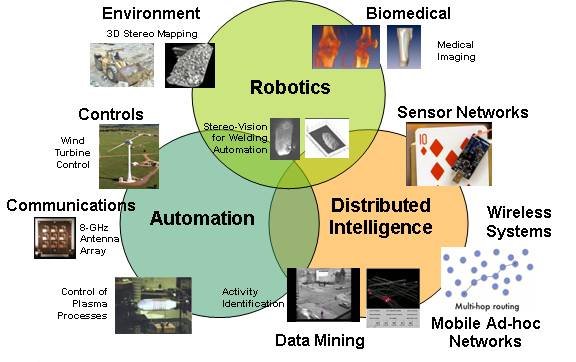
The Center for Automation, Robotics, and Distributed Intelligence has the following research agenda, as shown in the figure below. The three broad areas of robotics, automation, and distributed intelligence intersect in a variety of interdisciplinary projects.

|
Focus areas include
|
CARDI research
can be found in | |
|---|---|---|
In 2005, a Tech Fee grant and CARDI funds were used to create a new sensor network testbed. The testbed includes 52 sensors that can sense temperature, humidity, ambient light, and photosynthetically active light. We use the lab to study wireless communication protocols and monitoring/tracking applications. Faculty currently working with the lab (or planning to work with the lab) are Tracy Camp, Qi Han, William Hoff, and Kevin Moore.
Monthly meetings
A CARDI meeting is held once a month, over lunch One of the purposes of the meetings
is to make sure that members are aware of each other's research.
We typically have one person provide a short, informal presentation of their research.
This often leads to new ideas and joint proposals. We also discuss business issues,
such as the use of the budget, center policies, and upcoming events.
At the meetings we describe and introduce opportunities for collaboration.
For example, we occasionally have guests from industry or other research groups that
are interested in collaboration.
In addition, we have an annual end-of-year luncheon with members, students, and guests
where we celebrate our accomplishments and promote interaction.
Sponsor colloquia series
CARDI sponsors a colloquium at least once a semester. Occasionally we will
bring in distinguished speakers, and these are advertised widely. We recently hosted
a meeting of the AIAA Technical Committee on Space Automation and Robotics, where
many distinguished speakers from JPL, NASA, Lockheed Martin, and other agencies
gave talks on space robotics.
Annual Open House and Research Fair
This annual event highlights current research activities by faculty and graduate students
associated with CARDI. Students whose advisor is a member of CARDI are eligible to present
a poster during the Fair. All poster presenters also give a 5 minute "elevator speech" of
their research. Printing costs are covered by CARDI, and $150 awards are given to two students
(one for best poster and one for best presentation).
Promote CSM and CARDI to visitors, industry, and funding agencies
Promoting CSM and CARDI to visitors, industry, and funding agencies is an
important goal of our agenda. This is important to make potential sponsors
aware of our capabilities, recruit graduate students, and raise the reputation
of faculty members (especially untenured professors). To achieve these goals,
we bring in speakers, maintain a website, host visitors from industry, and
organize a CARDI research fair. CARDI also hosts visiting scholars, attracted
by our reputation and multidisciplinary research activities.